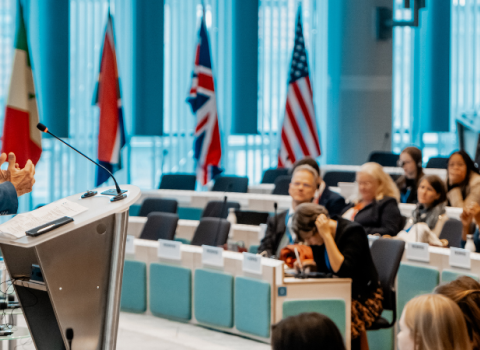The communist legacy leaves researchers exposed to fee-charging publishers who don’t do peer review or editing. But a fightback is underway

Photo: Selena N. B. H / Flickr
“After a more than modest career, some researchers started to publish a very high number of articles, in some cases more than 100 research articles per year, which means one article every three days,”said Romania’s top research association, Ad Astra, in March, as it signalled that a troubling culture of publication fraud is taking root.
Researchers in Romania have been struggling for a while with the rise of predatory publishing, in which charges per paper are levied by rogue publishers who do not conduct quality control, peer review, or do any editing. But now, there is a push back against what has become a growing phenomenon in the world of academic publishing.
This spring, the Babeș-Bolyai University of Cluj, announced new open science strategy, with the aim of both making research accessible and of ensuring its integrity. Radu Silaghi-Dumitrescu, president of the scientific council, said the university’s approach is rooted in the Diamond Access Publishing model, under which neither authors nor readers pay for access, but rather publishers are recompensed by public or charitable bodies.
The battle against predatory publishing started some two years ago, when research evaluation criteria published by the university excluded publications found on Beall’s list — an informal catalogue of predatory open access publishers, and of any article published by the Multidisciplinary Digital Publishing Institute, an open access publisher viewed by many to be predatory.
In Poland, the fightback against predatory publishing has been based on changes to the research evaluation system. Emanuel Kulczycki, head of the Scholarly Communication Research group at Adam Mickiewicz University, said there has been a shift from quantity-focused metrics to a more qualitative approach, encouraging researchers to publish fewer but higher-quality papers.
“The aim is to show researchers it's good to publish less,” Kulczcki said. This shift is crucial because the pressure to have a long list of published papers drives researchers towards predatory journals.
The Czech Republic presents another interesting case, where the notorious "Kafemlejnek" or "coffee grinder" system of counting research outputs when allocating funding, has been replaced by a more nuanced evaluation method, Methodology 2017+. This prioritises expert reviews over quantity of published papers, to encourage genuine research quality and impact.
In parallel, an international project that the Czech Republic is involved in, the Stop Predatory Practices initiative, is aiming to educate the academic community about the dangers of predatory publishing, offering training and workshops.
Soviet roots
Predatory publishing is an issue across Europe, but is more of a problem in central and eastern European countries. “When I investigate or observe the situation in Poland, Ukraine, Czech Republic, Slovakia, I see totally different patterns than in Belgium, France, Spain or the UK,” says Kulczycki, who is the author of a book tracing the roots of current evaluation systems in the east to their Russian origin.
Researchers are exposed to predatory publishers in cases where quantitative metrics are used in evaluating research, which is a holdover from the Soviet era. There is particular pressure to publish internationally, another perceived attraction of predatory publishers.
In the Czech Republic the scar left by the soviet heritage is still evident in social sciences, as seen in a study co-authored by Vít Macháček, a former academic. “There were virtually no social sciences during the soviet era, so after the collapse of the Soviet Union, we needed to immediately compete, starting from very low levels of quality with the west.” That left social sciences particularly susceptible to predatory publishing, with up to 80% of the research output in this domain being published in either predatory journals or local journals. This is both a result of the coffee-grinder evaluation of research and the drive for rapid catch up post-communism.
Traditional metrics
There are efforts to combat predatory publishing across Europe. The European Commission’s initiative to reform research assessment emphasises qualitative judgments and responsible use of quantitative indicators. This agreement, endorsed by over 350 organisations, aims to move beyond traditional metrics like publication counts and citations.
Science Europe, which represents major public organisations that fund or perform research in Europe, is also pushing for open access. Some of its best practices now include examples from Poland, where the national funding agency has developed an interactive webpage with clear guidance and checklists on its application and evaluation processes. Similarly, Croatia, is building international partnerships to expand its pool of reviewers, to combat quality issues and reviewer fatigue.
The fight against predatory publishing is complicated by the difficulty of defining it. A comment published in Nature in 2019 told the story of a summit that took 12 hours of discussions and three rounds of voting to decide on a broad definition that encompasses the characteristics of misleading information, lack of transparency, and poor editorial practices. But even this definition is not clear enough to be able to handle all cases.
On top of the problem of definition, the war against predatory publishing has become more complicated because these publishers have morphed from small, local publishers, with no scientific credentials, to larger, global companies, Kulczycki notes. “When I had responsibility at the Ministry of Science and Higher Education in Poland for designing a national ranking of journals for evaluation purposes, it was easy to communicate […] not [to] publish in small publishers who are predatory. But it was impossible to communicate [where] we should stop publishing internationally.”
To complicate things further, not all attempts to push back against predatory publishing are motivated by the right reasons. Silaghi-Dumitrescu pointed to a troubling trend in Romania, where some influential individuals, who have built their careers on hollow titles, are pushing for very strict evaluations. “The old generation, who managed to take advantage of the system, now feels threatened by those who have published a lot, including in predatory journals,” Silaghi-Dumitrescu said.
As disparate initiatives pop up in various central and eastern European countries, the answer seems to lie not in the fighting predatory journals, but in reducing the pressure on researchers by valuing quality over quantity. “After ten years of research and also science policy, I think that the only way is a systemic change by reducing the publication pressure,” Kulczycki said.





 A unique international forum for public research organisations and companies to connect their external engagement with strategic interests around their R&D system.
A unique international forum for public research organisations and companies to connect their external engagement with strategic interests around their R&D system.